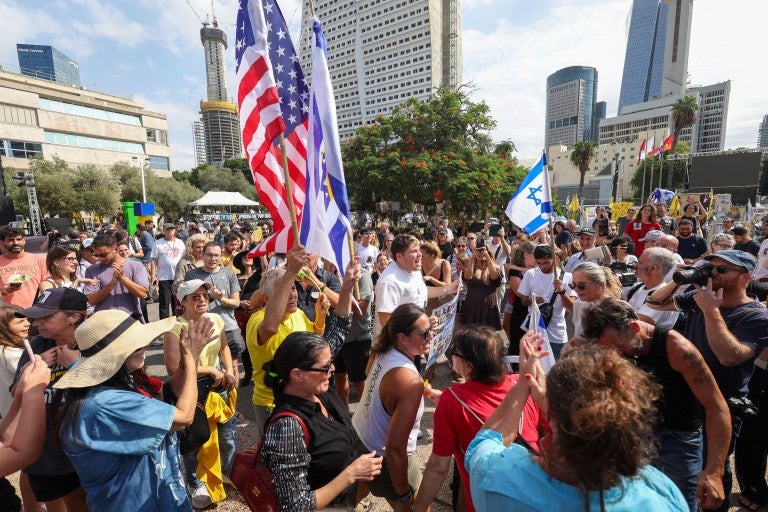October 13, 2025 — Miami
This column originally appeared in the Miami Herald.
I never thought I’d be so happy to see so many people crying.
I have been transfixed by the photos and videos of the 20 surviving hostages who were finally reunited Monday with their loved ones after 738 days of brutal captivity after Hamas kidnapped them on Oct. 7, 2023. These were tears of joy, something that has been in short supply in Israel for more than two years.
But my heart dropped as I watched footage of a procession of Red Cross vehicles carrying the remains of four hostages who were murdered when Hamas invaded Israel or died in captivity — a stark reminder that while the fighting may have stopped in Gaza, the war is not yet over for Israelis.
Another 24 deceased hostages are still in Gaza. They must all come home. While we continue to fight for their return and hold Hamas to the terms of the agreements that led to a ceasefire, we must also recognize this historic and potentially pivotal moment for the Middle East.
Two years after Hamas’s brutal terrorist onslaught, an attack designed to derail peace and destroy hope, there is now a real opportunity to move forward toward a better future for Israelis and Palestinians and indeed for the entire region. Hamas and its benefactor Iran sought to shatter the progress represented by the Abraham Accords and the growing dialogue between Israel and Saudi Arabia. They failed.
Today, Hamas’ terror infrastructure lies in ruins in Gaza. Hezbollah has been pushed back in Lebanon. The Syrian dictator Bashar al-Assad, responsible for slaughtering more than 600,000 of his own citizens, is gone. Iran’s nuclear ambitions have been severely set back through unified resolve. The Abraham Accords are still intact and under President Donald Trump’s leadership, nations are coming together in an unprecedented way to push for a new reality in the region.
Now the Middle East can finally move ahead with the very thing Hamas and Iran sought to destroy: a future defined by peace, not terror — a future of cooperation, innovation and shared prosperity.
The release of the hostages is only the first phase. The Arab and Muslim-majority countries that support President Trump’s 20-point peace plan must maintain pressure on Hamas to fulfill the terms of the deal by returning the remains of the deceased hostages to their families.
Then Hamas must be pressed to disarm and end its control of Gaza. Hamas cannot be allowed to govern or rearm. It remains a terrorist organization that openly calls for the destruction of Israel and repeats its desire to carry out “another Oct. 7.” This is not acceptable, and those who truly seek peace must not tolerate it.
We must also not forget that Israel continues to face multiple active fronts against Hezbollah in Lebanon, Iranian proxies in Syria and even the Houthis in Yemen who just this week fired a missile toward Israel. This war may end, but the threats persist. The resolve of the United States, Israel and our allies must persist as well.
This is a moment the entire world and anyone who claims to support peace should celebrate. Yet in an upside-down moral landscape, we still see attempts to glorify Hamas and minimize its atrocities. Words matter. Leadership matters. When public figures normalize or excuse calls for violence, whether through slogans like “Globalize the Intifada” or open praise for terrorist groups, they help create an atmosphere that endangers Jews and non-Jews alike. Even as we celebrate, we remain steadfast in our mission to ensure that this moment leads to lasting peace, regional cooperation and a future where hostage-taking, terrorism and hatred are replaced with coexistence, freedom and hope.
Brian Siegal is the regional director of the American Jewish Committee Miami and Broward regional office.



